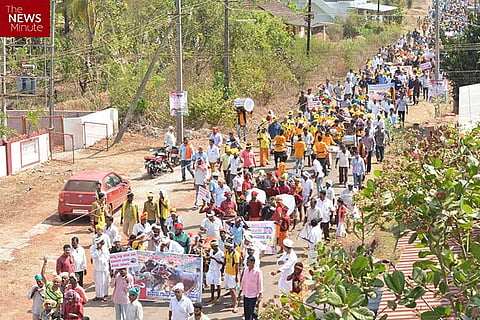

If Friday was the turn of urbane Mangaluru to declare its cultural pride, Saturday saw the rural population that organises kambala cattle races come out in force to demand that the ban on the sport be repealed.
Around 4000 people gathered at the Swaraj Maidan in Moodbidri on Saturday, bringing around 200 pairs of their prized buffaloes to show off to the world.
While kambala was banned in 2016 following the AWBI approaching the Karnataka High Court, the movement for the repeal of the ban picked up steam this week after jallikattu was made legal in Tamil Nadu.
The protests in Mangaluru were led by students, but in Moodbidri, it was the buffalo owners whose lives have been directly affected by the ban who took charge. Seeking an immediate ordinance allowing kambala, protesters walked from Swaraj Maidan to Kadalakere Nisargadhama in Moodbidri, chanting "Ulisi Ulisi Kambala Ulisi".
Courtesy: Prajwal Bhat
Although there had been plans to organise kambala races as part of the protest, Gundapala Kadamba, the Secretary of the Moodbidri Kambala Samiti announced that the organisers had cancelled plans to hold races today because they wished to respect the laws. However, he added that their main demand was for an immediate reversal of the ban.
Abhayachandra Jain, the Moodbidri MLA who is one of the main organisers of the protest, said that they would ensure that kambala would be held in the state soon.
"After February 6, we will raise the issue in the Assembly and get permission for kambala from the cabinet. With the support of MP Nalin Kumar Kateel, we will take the matter to Delhi. All political parties are together here. Kambala is celebrated by Hindus, Muslims and Christians alike. 4000 people have gathered along with 200 buffalo owners," he said.
Much like the jallikattu protesters in Madurai and other parts of Tamil Nadu had done, the protesting buffalo owners and workers gathered here were eager to emphasise the hoary tradition and strong love for animals behind the sport.
As Prabhakar Shetty of Meeyar House in Borkatte declared, “This is Tulu Nadu's sport. And we take care of the buffaloes like they are our children. We feed them A-quality horse gram, and a team of 12-15 people takes care of each animal,” he said, adding that even more care is showered by larger teams of workers on more mature animals.
Francis Flavy D'Souza, another cattle-owner, took the description of loving care for the animals even further. “Kambala is tradition for us. We take great care of the buffaloes, feed them horse gram, oil their skins, and even check their recesses everyday to ensure they are healthy. The last thing you want in a kambala is a buffalo with motion problems,” he laughed, before adding, “We walk with the kona (buffalo), go swimming with them and at other times plough the field with them."
Alongside the owners, a number of agricultural labourers also participated in the protest, helping to care for the animals while the procession wound its way around Moodbidri. These labourers said that the ban on kambala was a crisis for them, both in denying them the work of caring for buffaloes and taking away one of their main cultural activities.
Purshottam, a labourer who works for Ramaiah Bhandari of the Kathyapadavu Thanda (team), from Punkedayadadi, said, "We have been doing this for 20-25 years. When kambala was banned, we stuck to agriculture, but what we really wanted was to continue the sport. It is out of our own interest that we are doing it.”
He conceded that the animals do face the stick during races, but compared kambala favourably to sports such as horse racing. “We do hit the buffaloes, but unlike horse racing we don't sit on top of them. The jockey runs behind,” he explained.
Rajesh Shetty, a buffalo owner from Raisheetala conceded that the sport does lead to injuries for the jockeys sometimes, but felt this was not reason enough to ban the sport. “"There are around 20-22 races every year beginning from November to March. There have been injuries to jockeys and there are times when the jockey is in pain, but that’s no reason to ban kambala."
Courtesy: Shreya Bavar
Having made a significant show of strength in the coastal region, the organisers of the protest said that the next step would be for the protesters to make their mark in the state capital, too. Hence, they announced, the protests would next move to Bengaluru, where an expected gathering of 5,000 protesters would demonstrate at Freedom Park.
Watch a video on the protests here: